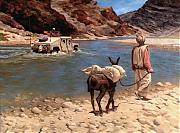An Iraqi Tribal Chief Opposes The Jihadists, And Prays
(...)
Part of the sheik’s mission is rooted in the tribal law of revenge. His father was killed by Al Qaeda in 2004 for opposing its kind of fundamentalism. Two brothers were abducted and never heard from again, and a third brother was shot dead, he said. He has survived three car bombs outside the home he shares with his wife and five children.
Residents in parts of Anbar say the split in the Sunni insurgency is widening, with moderate tribal leaders and nationalist guerrillas pitted against fundamentalist warriors and rival tribes. That has led to a sharp increase in Sunni-on-Sunni violence across Anbar, especially in the past week, deepening the chaos of Iraq’s civil war.
Al Qaeda remains a major force, and the relentless violence from all sides has turned the province into a failed region, according to a classified Marine intelligence assessment that was leaked to reporters last year.
As part of a broad review of options in Iraq, President Bush is looking at whether to give greater support to Sunni Arab tribal leaders who have grown disillusioned with the radical arm of the insurgency. It is a strategy long urged by officials in Sunni-dominated Saudi Arabia and now vigorously backed by Secretary of State Condoleezza Rice.
The effort would have echoes of the American military’s promotion of South Vietnamese “village militias” during the Vietnam War, which some American counterinsurgency experts say was a relative success.
Sheik Abdul Sattar and the Anbar Salvation Council, the group of 25 tribes that the sheik said he had helped pull together to fight Al Qaeda, would be central to any such move by the Americans.
The sheik said he and his allies, who also call themselves the Anbar Awakening, had recruited 6,000 fighters from the tribes into the Anbar police, helped appoint a new provincial police chief and formed a 2,500-member “emergency brigade” answering to him.
...
http://www.nytimes.com/2007/03/03/wo...rssnyt&emc=rss









Bookmarks